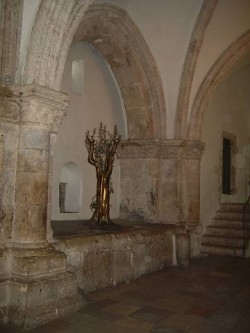 … when we are asked, ‘Where is the Church ?’ lean but answer, ‘Where it was’ – the Church only is while it is one, for it is individually as He who animates and informs it.
… when we are asked, ‘Where is the Church ?’ lean but answer, ‘Where it was’ – the Church only is while it is one, for it is individually as He who animates and informs it.
Moz. II 400 (16.7.1842)
… in these bad times it is necessary for all Catholics to recollect, that this doctrine of the Church’s individuality and, as it were, personality, is not a mere received opinion or understanding, which may be entertained or not, as we please, but is a fundamental, necessary truth.
Diff. II 236 (27.12.1874)
…He [Christ] is the sole self-existing principle in the Christian Church, and everything else is but a portion or declaration of Him … There is under the Gospel but One proper Priest, Prophet, and King, Altar, Sacrifice, and House of God. Unity is its characteristic sacrament ; all grace flows from One Head, and all life circulates in the members of One Body. And what is true of priests and sacrifices, is true of righteous and holy men. It is their very privilege thus to be taken into Christ, to exist in Christ, as already in their mortal life “they have their being” in God.
Jfc. 198 (1838)
… the Catholic Church has lasted one through all time … It was by means of faith, which is not only the beginning of all acceptable service, but is the binding principle of the Church. “This is the victory which overcometh the world, our faith.”(1 Jn 5:4).
S.N. 76 (27.4.1851)
…the Church is one, and that, not only in faith and morals, for schismatic’s may profess as much as this, but one, wherever it is, all over the world ; and not only one, but one and the same, bound together by its one regimen and discipline and by the same regimen and discipline, – the same rites, the same sacraments, the same usages, and the same one Pastor.
Diff. II 236 (27.12.1874)
It is not the Church enforces on them faith, but faith obliges them to take the Church
S.N. 77 (27.4.1851)
… our Saviour prays that we may be one in affection and in action … I might rest the necessity of Christian unity upon one single institution of our Lord’s, the Sacrament of Baptism. Baptism is a visible rite confessedly ; and St. Paul tells us that, by it, individuals are incorporated into an already existing body. He is speaking of the visible body of Christians, when he says, “By one Spirit are we all baptized into one body.” (1 Cor 12:13)
P.S. VII 235 (8.,15., 22.11.1829)
… the Divine Baptism, wherewith God visits us, penetrates through our whole soul and body. It leaves no part of us uncleansed, unsanctified. It claims the whole man for God. Any spirit which is content with what is short of this, which does not lead us to utter self-surrender and devotion ; which reserves something for ourselves ; which indulges our self-will ; which flatters this or that natural inclination or affection ; which does not tend to consistency of religious character ; – is not from God. The heavenly influence which He has given us is as intimately present, and as penetrating – as catholic – in an individual heart as it is in the whole at large … Thus the heart of every Christian ought to represent in miniature the Catholic Church, since one Spirit makes both the whole Church and every member of it to be His Temple.
S.D. 131. 132 (4.6.1843)
… the characteristics of the Spirit’s influence are, that it is the same everywhere, that it is silent, that it is gradual, that it is thorough ; not violent, or abrupt, or fitful, or partial, or detached … Any spirit which professes to come to us alone, and not to others, which makes no claim of having moved the body of the Church at all times and places, is not of God, but a private spirit of error.
S.D. 130 (4.6.1843)
… God’s Spirit dwells in the Catholic Church, and has visited the whole world. New creeds, private opinions, self-devised practices, are but delusions… Vehemence, tumult, confusion, are no attributes of that benignant flood with which God has replenished the earth. That flood of grace is sedate, majestic, gentle in its operation. If at any time it seems to be violent, that violence is occasioned by some accident or imperfection of the earthen vessels into which it vouchsafes to pour itself ; and is no token of the coming of Divine Power.
S.D. 130 – 131 (4.6.1843)
As He makes the Church one, which, left to itself, would separate into many parts ; so He makes the soul one, in spite of its various affections and faculties, and its contradictory aims. As He gives peace to the multitude of nations, who are naturally in discord one with another, so does He give an orderly government to the soul, and set reason and conscience as sovereigns over the inferior parts of our nature. As He leavens each rank and pursuit of the community with the principles of the doctrine of Christ, so does that same Divine Leaven spread through every thought of the mind, every member of the body, till the whole is sanctified.
S.D. 132 (4.6.1843)
… He who attempts to set up God’s kingdom in his heart, furthers it in the world.
S.D. 134 (4.6.1843)
… while Christians do not seek after inward unity and peace in their own breasts, the Church itself will never be at unity and peace in the world around them.
S.D. 132 (4.6.1843)
